高二语法练习if条件句及虚拟语气
- 格式:doc
- 大小:33.50 KB
- 文档页数:1

英语动词有三种语气:陈述语气、祈使语气、虚拟语气(用来表示说的话不是事实,或者是不太可能发生的情况,而是一种愿望,建议,假设的语气叫虚拟语气。
)虚拟语气的考点:1•条件句中的虚拟语气的用法;2.条件句中虚拟语气的倒装;3•名词性从句中虚拟语气的用法;4•几种特殊结构中虚拟语气的用法;5.虚拟语气时态的判定。
一、If引导的虚拟条件句区别:If it rains tomorrow,the crops will be saved.陈述语气If it rained tomorrow,the crops would be saved.虚拟语气真实条件状语从句与非真实条件状语从句真:eg .If he doesn' hurry up, he will miss the bus.如果他不快点,他将错过巴士。
(真实条件状语)(不是虚拟语气)If he is free, he will ask me to tell stories.如果他是空闲的,他会要求我讲故事。
(真实条件状语)(不是虚拟语气)非真:eg. If I were you, I would go at once.如果我是你,我马上就会去。
(非真实条件状语从句)二、虚拟语气在条件从句中:【例句】1.If you had come a few minutes earlier,you would have met him.要是你早来几分钟的话,你就能见到他了。
(与过去事实相反)2.lf it were sunny tomorrow, i would come to see you.明天要是天气好的话,我来看你。
(与将来事实可能相反)3.lf i were you, i would go at once.假如我是你的话,我会马上走。
(与现在事实相反,事实上我不可能是你)主从句的谓语形式(一)与现在事实相反的虚拟条件句表示与现在事实相反的情况,例 1.lf I were you, I would take an umbrella.如果我是你,我会带把伞。
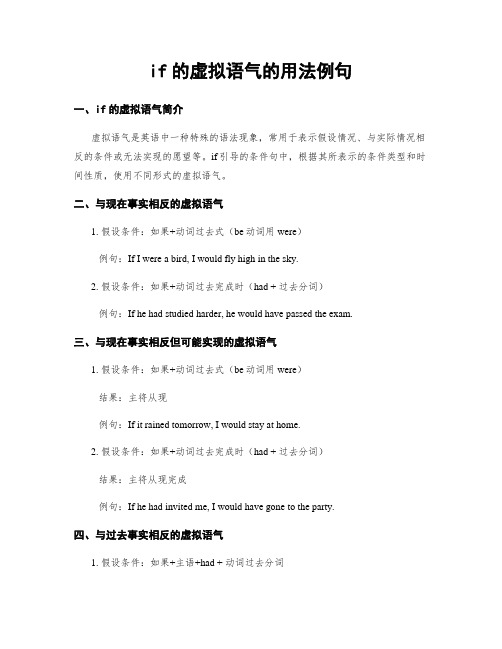
if的虚拟语气的用法例句一、if的虚拟语气简介虚拟语气是英语中一种特殊的语法现象,常用于表示假设情况、与实际情况相反的条件或无法实现的愿望等。
if引导的条件句中,根据其所表示的条件类型和时间性质,使用不同形式的虚拟语气。
二、与现在事实相反的虚拟语气1. 假设条件:如果+动词过去式(be动词用were)例句:If I were a bird, I would fly high in the sky.2. 假设条件:如果+动词过去完成时(had + 过去分词)例句:If he had studied harder, he would have passed the exam.三、与现在事实相反但可能实现的虚拟语气1. 假设条件:如果+动词过去式(be动词用were)结果:主将从现例句:If it rained tomorrow, I would stay at home.2. 假设条件:如果+动词过去完成时(had + 过去分词)结果:主将从现完成例句:If he had invited me, I would have gone to the party.四、与过去事实相反的虚拟语气1. 假设条件:如果+主语+had + 动词过去分词结果:主语+would/could/might + have + 过去分词例句:If I had known the truth, I would have made a different decision.2. 假设条件:如果+主语+had not +过去分词形式,结果也用一般过去时态例句:If we hadn't missed the train, we would have arrived on time.五、与将来事实相反的虚拟语气1. 假设条件:如果+动词过去式(be动词用were)结果:主将从现(应该+动词原形)例句:If they were here, they would help us.2. 假设条件:如果+should/were to/might/could/would + 动词原形结果:主将从现(应该+动词原形)例句:If he should call, please ask him to wait.六、虚拟语气中常用的连词和引导短语1. if: 引导条件状语从句,表示假设情况。
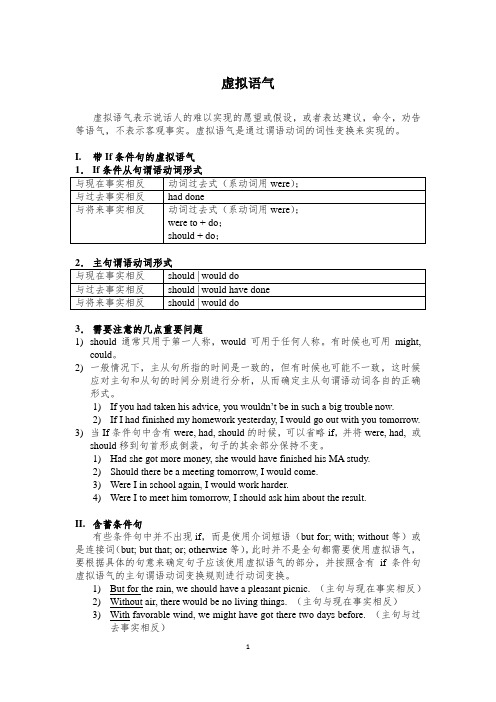
虚拟语气虚拟语气表示说话人的难以实现的愿望或假设,或者表达建议,命令,劝告等语气,不表示客观事实。
虚拟语气是通过谓语动词的词性变换来实现的。
I.带If条件句的虚拟语气3.需要注意的几点重要问题1)should通常只用于第一人称,would可用于任何人称。
有时候也可用might,could。
2)一般情况下,主从句所指的时间是一致的,但有时候也可能不一致,这时候应对主句和从句的时间分别进行分析,从而确定主从句谓语动词各自的正确形式。
1)If you had taken his advice, you wouldn’t be in such a big trouble now.2)If I had finished my homework yesterday, I would go out with you tomorrow.3)当If条件句中含有were, had, should的时候,可以省略if,并将were, had, 或should移到句首形成倒装,句子的其余部分保持不变。
1)Had she got more money, she would have finished his MA study.2)Should there be a meeting tomorrow, I would come.3)Were I in school again, I would work harder.4)Were I to meet him tomorrow, I should ask him about the result.II.含蓄条件句有些条件句中并不出现if,而是使用介词短语(but for; with; without等)或是连接词(but; but that; or; otherwise等),此时并不是全句都需要使用虚拟语气,要根据具体的句意来确定句子应该使用虚拟语气的部分,并按照含有if条件句虚拟语气的主句谓语动词变换规则进行动词变换。
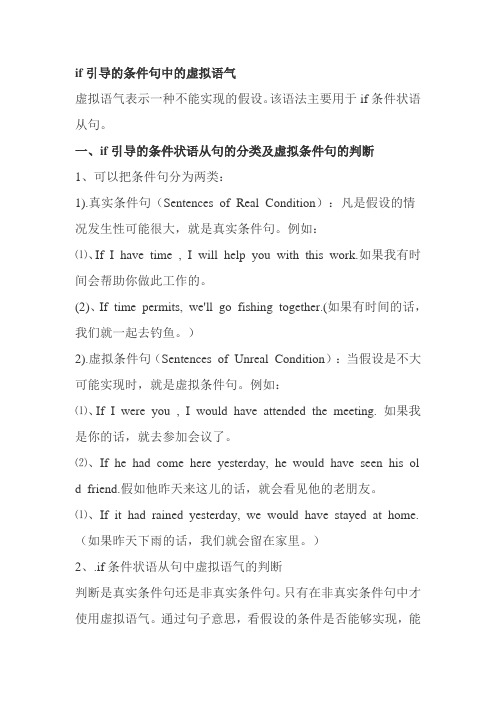
if引导的条件句中的虚拟语气虚拟语气表示一种不能实现的假设。
该语法主要用于if条件状语从句。
一、if引导的条件状语从句的分类及虚拟条件句的判断1、可以把条件句分为两类:1).真实条件句(Sentences of Real Condition):凡是假设的情况发生性可能很大,就是真实条件句。
例如:⑴、If I have time , I will help you with this work.如果我有时间会帮助你做此工作的。
(2)、If time permits, we'll go fishing together.(如果有时间的话,我们就一起去钓鱼。
)2).虚拟条件句(Sentences of Unreal Condition):当假设是不大可能实现时,就是虚拟条件句。
例如:⑴、If I were you , I would have attended the meeting. 如果我是你的话,就去参加会议了。
⑵、If he had come here yesterday, he would have seen his old friend.假如他昨天来这儿的话,就会看见他的老朋友。
⑴、If it had rained yesterday, we would have stayed at home.(如果昨天下雨的话,我们就会留在家里。
)2、.if条件状语从句中虚拟语气的判断判断是真实条件句还是非真实条件句。
只有在非真实条件句中才使用虚拟语气。
通过句子意思,看假设的条件是否能够实现,能够实现是真实条件句,不能使用虚拟语气;假设的条件不能实现则是非真实条件句,要用虚拟语气。
判断这个假设是与哪个事实相反。
通常有三种情况:①与过去事实相反。
②与现在事实相反。
③与将来事实可能相反。
3、“后退一步法”后退一步法是指在准确地判断了该句与哪一事实相反后,按虚拟语气的后退一步法处理从句谓语动词的时态。

if引导的虚拟条件句1、虚拟语气If引导的真实条件句(16):1.主将从现Ifsheshowsup,we’llstickwithher.I’llgiveyouacallifanything comesup.语法深化I’llkickyououtifdon’tlistentome.2.主祈从现Catchmeifyoucan.Lovemeifyoudare.Ifhecomes,heisgoingtobringh isviolin.虚拟语气If引导的虚拟条件句:1.与如今事实相反的假设条件从句主句一般过去时should(wouldcould)+动词原形语法深化假如我是你,我不会让他走。
=If2、Iwereyou,Iwouldnotlethimgo.假如我能飞,你就抓不到我。
=IfIcouldfly,youwouldnotcatchme.虚拟语气If引导的虚拟条件句:2.与将来事实相反的假设条件从句主句一般过去时should(wouldcould)+动词原形动词原型语法深化Wereto+Should+动词原型Ifyoushouldsucceed,everythingwouldbeallright.Ifyouweretosuc ceed,everythingwouldbeallright.虚拟语气If引导的虚拟条件句:3.与过去事实相反的假设条件从句3、主句Haddonewould,should,could+havedone语法深化Ifhehadcomeyesterday,Ishould/wouldhavetoldhimaboutit.Ifheha dnotbeenillandmissedmanyclasses,hewouldhavemadegreaterprogr ess.虚拟语气If引导的虚拟条件句:4.混合虚拟语气Ifyou_______himyesterday,you______whattodonow.(ask,know)语法深化〔从句与过去事实相反,主句与如今事实相反。

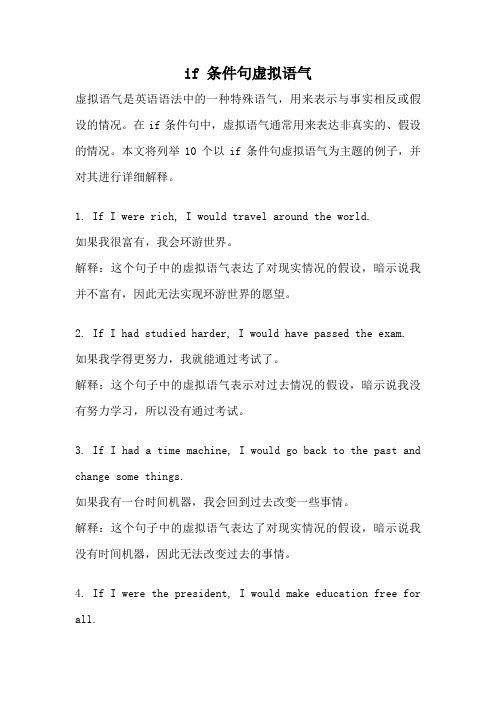
if 条件句虚拟语气虚拟语气是英语语法中的一种特殊语气,用来表示与事实相反或假设的情况。
在if条件句中,虚拟语气通常用来表达非真实的、假设的情况。
本文将列举10个以if条件句虚拟语气为主题的例子,并对其进行详细解释。
1. If I were rich, I would travel around the world.如果我很富有,我会环游世界。
解释:这个句子中的虚拟语气表达了对现实情况的假设,暗示说我并不富有,因此无法实现环游世界的愿望。
2. If I had studied harder, I would have passed the exam.如果我学得更努力,我就能通过考试了。
解释:这个句子中的虚拟语气表示对过去情况的假设,暗示说我没有努力学习,所以没有通过考试。
3. If I had a time machine, I would go back to the past and change some things.如果我有一台时间机器,我会回到过去改变一些事情。
解释:这个句子中的虚拟语气表达了对现实情况的假设,暗示说我没有时间机器,因此无法改变过去的事情。
4. If I were the president, I would make education free for all.如果我是总统,我会让教育对所有人免费。
解释:这个句子中的虚拟语气表达了对现实情况的假设,暗示说我并不是总统,所以无法实现让教育免费的目标。
5. If it didn't rain tomorrow, we could go hiking.如果明天不下雨,我们可以去远足。
解释:这个句子中的虚拟语气表达了对未来情况的假设,暗示说明天可能会下雨,所以无法去远足。
6. If I had known you were coming, I would have prepared a meal for you.如果我知道你要来,我会为你准备一顿饭。

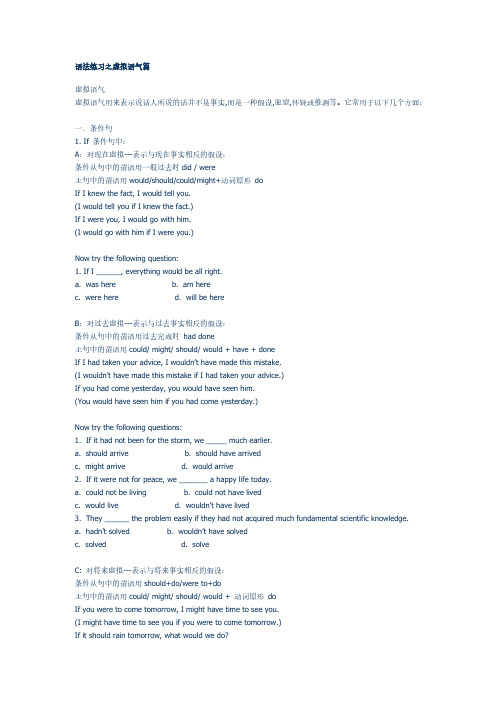
语法练习之虚拟语气篇虚拟语气虚拟语气用来表示说话人所说的话并不是事实,而是一种假设,愿望,怀疑或推测等。
它常用于以下几个方面:一.条件句1. If 条件句中:A:对现在虚拟---表示与现在事实相反的假设:条件从句中的谓语用一般过去时did / were主句中的谓语用would/should/could/might+动词原形doIf I knew the fact, I would tell you.(I would tell you if I knew the fact.)If I were you, I would go with him.(I would go with him if I were you.)Now try the following question:1. If I ______, everything would be all right.a. was hereb. am herec. were hered. will be hereB:对过去虚拟---表示与过去事实相反的假设:条件从句中的谓语用过去完成时had done主句中的谓语用could/ might/ should/ would + have + doneIf I had taken your advice, I wouldn’t have made this mistake.(I wouldn’t have made this mistake if I had taken your advice.)If you had come yesterday, you would have seen him.(You would have seen him if you had come yesterday.)Now try the following questions:1. If it had not been for the storm, we _____ much earlier.a. should arriveb. should have arrivedc. might arrived. would arrive2. If it were not for peace, we _______ a happy life today.a. could not be livingb. could not have livedc. would lived. wouldn’t have lived3. They ______ the problem easily if they had not acquired much fundamental scientific knowledge.a. hadn’t solvedb. wouldn’t have solvedc. solvedd. solveC: 对将来虚拟---表示与将来事实相反的假设:条件从句中的谓语用should+do/were to+do主句中的谓语用could/ might/ should/ would + 动词原形doIf you were to come tomorrow, I might have time to see you.(I might have time to see you if you were to come tomorrow.)If it should rain tomorrow, what would we do?(What would we do if it should rain tomorrow.)Now try the following question:1. If you ________ see Jane, what would you tell her?a. will be going tob. ought toc. are tod. were to2.省略If 的条件句当条件句中的If省略,要将were, had, should提到主语前面,形式倒装。

if引导的条件句中的虚拟语气虚拟语气表示一种不能实现的假设。
该语法主要用于if条件状语从句。
一、if引导的条件状语从句的分类及虚拟条件句的判断1、可以把条件句分为两类:1).真实条件句(Sentences of Real Condition):凡是假设的情况发生性可能很大,就是真实条件句。
例如:⑴、If I have tim e , I will help you with this work.如果我有时间会帮助你做此工作的。
(2)、If time permits, we'll go fishing together.(如果有时间的话,我们就一起去钓鱼。
)2).虚拟条件句(Sentences of Unreal Condition):当假设是不大可能实现时,就是虚拟条件句。
例如:⑴、If I were you , I w ould have attended the meeting. 如果我是你的话,就去参加会议了。
⑵、If he had come here yesterday, he would have seen his old friend.假如他昨天来这儿的话,就会看见他的老朋友。
⑴、If it had rained yesterday, we would have stayed at home.(如果昨天下雨的话,我们就会留在家里。
)2、.if条件状语从句中虚拟语气的判断判断是真实条件句还是非真实条件句。
只有在非真实条件句中才使用虚拟语气。
通过句子意思,看假设的条件是否能够实现,能够实现是真实条件句,不能使用虚拟语气;假设的条件不能实现则是非真实条件句,要用虚拟语气。
判断这个假设是与哪个事实相反。
通常有三种情况:①与过去事实相反。
②与现在事实相反。
③与将来事实可能相反。
3、“后退一步法”后退一步法是指在准确地判断了该句与哪一事实相反后,按虚拟语气的后退一步法处理从句谓语动词的时态。

虚拟语气考点一if条件句中的虚拟语气虚拟语气主句谓语动词从句谓语动词虚拟现在should/would/could/might+do过去式(be用were)虚拟过去should/would/could/might+have donehad+过去分词虚拟将来should/would/could/might+do过去式/were to do/should+do例:They might have found a better hotel if they had driven a few more kilometers.如果他们多开几公里的话,他们也许会找到一个更好的旅馆。
We would be back in the hotel now if you didn’t lose the map.如果你没有把地图丢了的话,我们现在就回到旅馆了。
Grace doesn’t want to move to New York because she thinks if she were to live there, she wouldn’t be able to see her parents very often.格蕾丝不想搬到纽约,因为她认为如果住在那里,她就不能经常看到她的父母了。
注意:如果在表示虚拟语气的if条件句中含有were, had或should, 可将if省略,然后将were, had或should移至主语之前。
Were it not for the support of the teachers, the student could not overe her difficulty.如果没有老师的帮助,这个学生克服不了她的困难。
如果主句和从句是对不同时间的事实的虚拟,则被称为错综虚拟语气。
此时主句常有明显的时间状语。
Maybe if I had studied science, and not literature then, I would be able to give you more help.也许如果当时我学的是理科而不是文科,那么我现在就可以给你更多的帮助了。
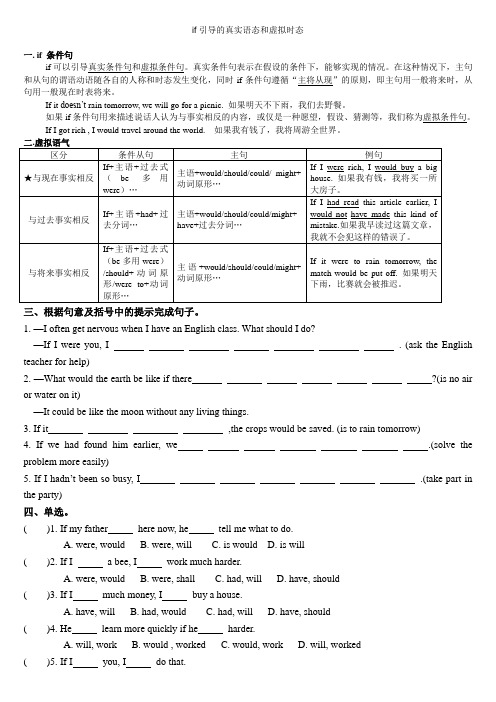
if引导的真实语态和虚拟时态一. if 条件句if可以引导真实条件句和虚拟条件句。
真实条件句表示在假设的条件下,能够实现的情况。
在这种情况下,主句和从句的谓语动语随各自的人称和时态发生变化,同时if条件句遵循“主将从现”的原则,即主句用一般将来时,从句用一般现在时表将来。
If it doesn’t rain tomorrow, we will go for a picnic. 如果明天不下雨,我们去野餐。
如果if条件句用来描述说话人认为与事实相反的内容,或仅是一种愿望,假设、猜测等,我们称为虚拟条件句。
If I got rich , I would travel around the world. 如果我有钱了,我将周游全世界。
三、根据句意及括号中的提示完成句子。
1. —I often get nervous when I have an English class. What should I do?—If I were you, I . (ask the English teacher for help)2. —What would the earth be like if there ?(is no air or water on it)—It could be like the moon without any living things.3. If it ,the crops would be saved. (is to rain tomorrow)4. If we had found him earlier, we .(solve the problem more easily)5. If I hadn’t been so busy, I.(take part in the party)四、单选。
( )1. If my father here now, he tell me what to do.A. were, wouldB. were, willC. is wouldD. is will( )2. If I a bee, I work much harder.A. were, wouldB. were, shallC. had, willD. have, should( )3. If I much money, I buy a house.A. have, willB. had, wouldC. had, willD. have, should( )4. He learn more quickly if he harder.A. will, workB. would , workedC. would, workD. will, worked( )5. If I you, I do that.A. was, wouldn’t were, wouldn’t C. am, won’t D. were, won’t( )6. It’s quite impossible that it will rain tomorrow. But if it,I would still go to the park.A. should rainsB. would rainC. rainedD. had rained五、汉泽英1. 如果我是你,我会帮助她。
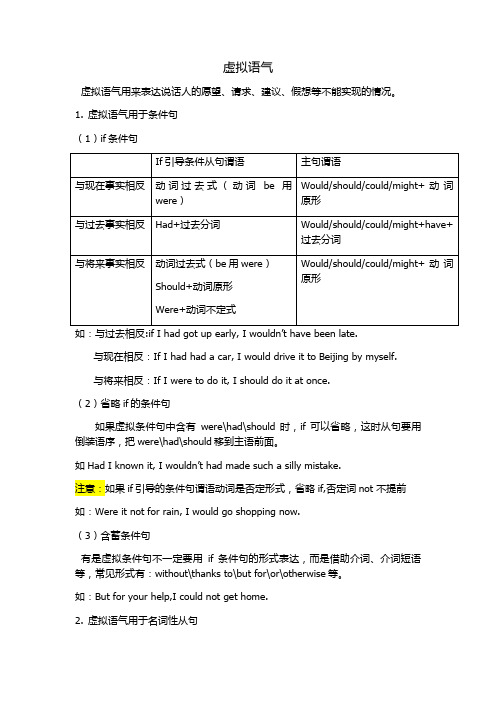
虚拟语气虚拟语气用来表达说话人的愿望、请求、建议、假想等不能实现的情况。
1.虚拟语气用于条件句(1)if条件句与现在相反:If I had had a car, I would drive it to Beijing by myself.与将来相反:If I were to do it, I should do it at once.(2)省略if的条件句如果虚拟条件句中含有were\had\should时,if可以省略,这时从句要用倒装语序,把were\had\should移到主语前面。
如Had I known it, I wouldn’t had made such a silly mistake.注意:如果if引导的条件句谓语动词是否定形式,省略if,否定词not 不提前如:Were it not for rain, I would go shopping now.(3)含蓄条件句有是虚拟条件句不一定要用if条件句的形式表达,而是借助介词、介词短语等,常见形式有:without\thanks to\but for\or\otherwise等。
如:But for your help,I could not get home.2.虚拟语气用于名词性从句(1)主语从句It is important\require...+主语从句在这里表示建议,必要,命令等意思的结构中,要用should +动词原形,should可以省略。
这类形容词和分词有:advised\advisable\better\desired\demand\imperative\important\natural\neces sary\ordered\proposed\possible\required\recommended\suggested\urgent\str ange等。
如: It is important (that)we (should) finish the work.(2)宾语从句A: suggest,require,order...+宾语从句在一些表示建议、愿望、要求、请求、劝告、意志、欲望、命令、安排、决定等动词引导的宾语从句中,要用虚拟语气。

虚拟语气是一项语法难点,为了让学员们便于理解与记忆,我们把虚拟语气分成三大块来讨论:1.名词从句中的虚拟语气标志词+should+动词原形2.条件从句中的虚拟语气①三种基本态②倒装虚拟句③混时虚拟句④含蓄虚拟句⑤跳层虚拟句3.其它情形中的虚拟语气(wish/would rather/It’s high time…/If only…/lest)一.三种基本形态(1)表虚拟的时间if从句谓语形式主句谓语形式现在:did / were would (should, might, could)+do过去:had done/ had been would (should/might/could)+have done(been)将来:were to/ should+do would (should, might, could)+do三种基本形态(2)(这是基础,建议牢记下面的例句,争取能脱口而出)与现在事实相反:If I had enough money, I would buy a book.与过去事实相反:If I had had enough money, I would have bought a book.与将来事实相反:If I were to have enough money, I would buy a book.If I should have enough money, I would buy a book.二、倒装虚拟句(只能与过去/将来事实相反,省去if,只有三种倒装形式)Had I had enough money, I would have bought a book.Were I to have enough money, I would buy a book.Should I have enough money, I would buy a book.三、混合时间虚拟语气(主要是抓住时间状语)(对过去事实虚拟+对现在事实虚拟)If I had studied English at school, I could read the English novel now.(对现在事实虚拟+对过去事实虚拟)If she were not so careless, she wouldn’t have made such a mistake.四、含蓄虚拟句(在四级考试中目前还未出现此考点,但在阅读中常见)3. 虚拟语气用在主语从句中。

高考if条件句虚拟语气1.Had he gone to the doctor right away。
he might still be alive.2.If you were older。
I would have allowed you to go there yesterday.3.If we had arrived here ten minutes earlier。
we would have caught the bus.4.If I had had more time。
I would have gone with him.5.If he had not gone out in the storm。
he would still be alive.6.If it were to rain tomorrow。
what would we do?7.If only I knew how to operate an electronic computer as you do.8.If it were to rain。
we would get wet.9.If ___。
he would have known the answer to the problem now.10.---- I thought you would come back tomorrow.I would if I didn't have to ___.11.If I had hurried。
I would have caught the train.12.If I had known that。
I wouldn't have done it.13.If I were you。
I wouldn't return the call.14.If the doctor had been available。
the child would not have died.15.If the doctor had come earlier。

If条件句和虚拟语气
If条件句和虚拟语气
条件句是包含条件从句的句子。
条件句分为真实条件句和非真实条件句。
真实条件句表示假设的情况有可能发生,可以用if和unless引导。
例如,如果需要,我会借给XXX。
如果他有时间,他会来的。
如果他在12点之前不来,我们就不会等他了。
除此之外,if还可以表示命令、建议或请求,这时相当于when。
例如,如果她打电话了,请通知我。
如果你见到XXX,请代我问候他。
在真实条件句中,will用于if从句中,不表示将来,而表示愿意或坚持的意思。
例如,如果你愿意走这条路,我会带你去经理办公室。
如果你每晚都喝醉酒,感到不适也就不足为奇了。
非真实条件句包括虚拟条件句和错综时间条件句。
虚拟条件句分为三类,分别与现在、过去和将来有关,且都表示事实相反。
其结构如下:
1.与现在事实相反:If+主语+动词的一般过去,主语
+would/could/might时(be动词一般用were)+动词原形。
2.与过去事实相反:If+主语+had+过去分词,主语+XXX
过去分词。
3.与将来事实相反:If+主语+一般过去时,主语+XXX动
词原形。
如果主语是were,则可以用虚拟语气来表示。
例如,如果我有更多的钱,我会去旅行。
在虚拟条件句中,条件从句的结果用主句来表示。
错综时间条件句则比较复杂,不在本文讨论范围内。
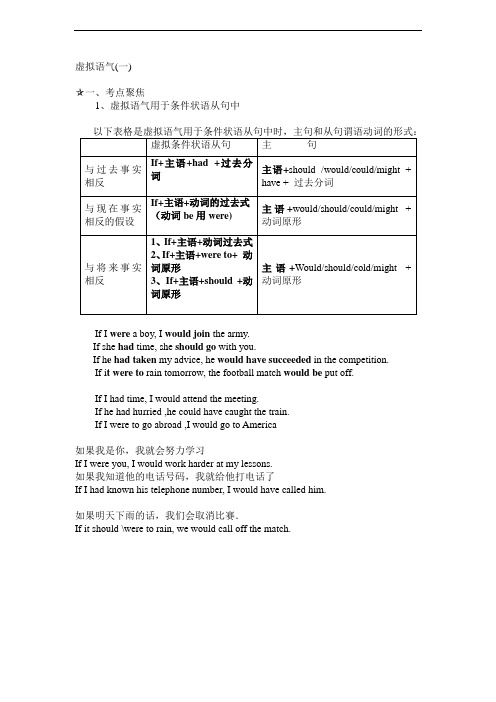
虚拟语气(一)一、考点聚焦1、虚拟语气用于条件状语从句中If I were a boy, I would join the army.If she had time, she should go with you.If h e had taken my advice, he would have succeeded in the competition.If i t were to rain tomorrow, the football match would be put off.If I had time, I would attend the meeting.If he had hurried ,he could have caught the train.If I were to go abroad ,I would go to America如果我是你,我就会努力学习If I were you, I would work harder at my lessons.如果我知道他的电话号码,我就给他打电话了If I had known his telephone number, I would have called him.如果明天下雨的话,我们会取消比赛.If it should \were to rain, we would call off the match.使用虚拟条件句要注意的几点:1.当条件状语从句表示的行为和主句表示的行为所发生的时间不一致时,被称为:错综时间条件句“,动词的形式要根据它所表示的时间作出相应的调整.If you had followed my advice , you would be better now.如果你听我的建议,你现在就会痊愈了.If you had studied hard before, you would be a college student now.如果你努力学习的话,你现在就会是大学生了.If they had worked hard, they would be very tired now.(从句说的是过去,主句指的是现在)2.省略句在条件句中,可省略if,把were ,had, should 提到句首,变为倒装句式.If I were at school again, I would study harder.Were I at school again, I would study harder.If you had come earlier, you would have met him.Had you come earlier, you would have met him.If it should rain tomorrow, we would not go climbing.Should it rain tomorrow, we would not go climbing.Were I a boy, I would join the army.Had he taken my advice, he would have succeeded.Were it not for the expense, I would go to Britain.2、虚拟语气用于名词性从句(1)虚拟语气在宾语从句中的运用。

虚拟语气讲解及练习虚拟语气在if引导的条件句中的用法三点:从句(条件)主句(目的)表示于现在事实相反的虚拟条件句If+主语+动词的过去式(be用were)If I had time, I would attendthe meeting.主语+would(should couldmight)+动词原型表示与过去事实相反的拟条件句If+主语+had+动词的过去分词If he had hurried ,he couldhave caught the train.主语+would(should couldmight)+have+动词的过去分词表示与将来事实相反的虚拟条件句1、If+主语+动词过去式2、If+主语+were to+ 动词原形3、If+主语+should +动词原形If I were to go abroad ,I wouldgo to America.主语+would(could shouldmight)+动词原型错综时间条件句——主从句时间不一致的情况下的虚拟语气有时条件从句中的动作与主句中的动作,发生的时间不一致,这是动作的形式应根据它所表示的时间加以调整。
If you had followed my advice , you would be better now.If you had studied hard before, you would be a college student now.though引导的方式状语从句中表示与将来事实相反,(表示将来的可能性不大),用would (might, could)+动词原形He acts as if he could win in the game .注意:1.在as if/as though 句中,如果有可能成为事实,用陈述语气。
例:He looks as if he going to be ill.2.as though或as if引导的状语从句,从句主语和主句主语相同时,从句中可省略主语和部分谓语。
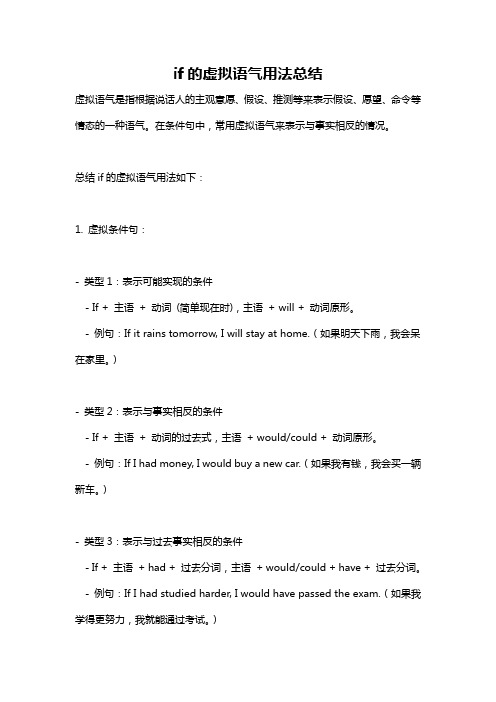
if的虚拟语气用法总结虚拟语气是指根据说话人的主观意愿、假设、推测等来表示假设、愿望、命令等情态的一种语气。
在条件句中,常用虚拟语气来表示与事实相反的情况。
总结if的虚拟语气用法如下:1. 虚拟条件句:- 类型1:表示可能实现的条件- If + 主语+ 动词(简单现在时),主语+ will + 动词原形。
- 例句:If it rains tomorrow, I will stay at home.(如果明天下雨,我会呆在家里。
)- 类型2:表示与事实相反的条件- If + 主语+ 动词的过去式,主语+ would/could + 动词原形。
- 例句:If I had money, I would buy a new car.(如果我有钱,我会买一辆新车。
)- 类型3:表示与过去事实相反的条件- If + 主语+ had + 过去分词,主语+ would/could + have + 过去分词。
- 例句:If I had studied harder, I would have passed the exam.(如果我学得更努力,我就能通过考试。
)2. 虚拟表达愿望:- 类型1:表示对现在或将来的愿望- 希望、愿望等动词+ (that) + 主语+ (should) + 动词原形。
- 例句:I wish (that) I could speak fluent English.(我希望我能说一口流利的英语。
)- 类型2:表示对过去的愿望- 希望、愿望等动词+ (that) + 主语+ (should) + have + 过去分词。
- 例句:I wish (that) I had studied abroad when I was younger.(我希望我年轻时出国留学了。
)3. 虚拟表达建议、命令等:- 动词原形+ (that) + 主语+ (should) + 动词原形。
- 例句:I suggest (that) you should take a break.(我建议你应该休息一下。
高二语法练习if条件句及虚拟语气
一、单项选择
1. If I _____ where he lived, I _____ a note to him.
A. know, would have sent
B. had known, would have sent
C. know, would send
D. knew, would have sent 2. Mary is ill today. If she _____, she _____ absent from school.
A. were not ill; wouldn’t be
B. had been ill; wouldn’t have been
C. had been ill; should have been
D. hadn’t been ill; could be 3. He acted as if he _____ everything in the world.
A. knew
B. knows
C. has known
D. won't know 4. If you had enough money, what _____?
A. will you buy
B. would you buy
C. would you have bought
D. will you have bought 5. If Mr. Young _____ with justice, he _____ such a wrong thing.
A. were treated; wouldn’t do
B. had been t reated; wouldn’t have done
C. were treated; wouldn’t have done
D. had been treated; wouldn’t do
6. What _____ if there _____ no light during the day?
A. will happen; was
B. would happen; is
C. happens; were
D. would happen; were
7. The spokesman acted that way as if he _____ anything about the accident but actually he did.
A. doesn’t hear
B. didn’t hear
C. haven’t heard
D. hadn’t heard
8. If it ____ not for the fact that you ____ ill now, I would surely punish you.
A. is; are
B. were; were
C. were; are
D. was; were
9. Many Chinese movie stars now have given up their Chinese nationality. If I were them,
I _____ that.
A. shouldn’t do
B. didn’t do
C. hadn’t done
D. won’t do
10. I want to get back by 5 o’c lock if _____.
A. likely
B. can
C. possible
D. probable
11. It seems as if it _____ already summer now but it is only February.
A. is
B. was
C. were
D. had been
12. If Henry had not pulled his cap low over his brow, he _____ by the police.
A. might be recognized
B. might have been recognized
C. would have recognized
D. was to have been recognized
13. There is a ring at the door. That _____ be the postman, I suppose.
A. will
B. would
C. is going to
D. was going to
14. Look at the dark clouds—there _____ be a storm.
A. will
B. must have been
C. is going to
D. would
15. —Why are you taking the pictures down?
—I _____ the wall.
A. paint
B. have just painted
C. am going to paint
D. will have painted 16. — Can I stay at home tomorrow?
—Yes, you can if it_____.
A. will snow
B. is going to snow
C. snows
D. snowed
17. I don’t know if he _____ this afternoon. But if he _____, I will tell you.
A. will come; will do;
B. comes; will do
C. will come; does
D. comes; does
18. —I thought I asked you to fix the radio.
—Oh, I’m sorry. I _____ it right away.
A. am to do
B. will do
C. was about to do
D. am going to do
19. The WTO can’t live up t o its name _____ it does not include a country that is home to one fifth of mankind.
A. as long as
B. whether
C. if
D. even though
20. Ask him to ring me up if you _____ him.
A. see
B. saw
C. would see
D. will see
21. It’s so late. I don’t think he ______ come.
A. would
B. should
C. is going to
D. shall
22. If people _____ polluting the air, animals and plants will die soon.
A. don’t stop
B. didn’t stop
C. shall not stop
D. haven’t stopped
23. If you _____ an interesting day out, ______ the Science Museum.
A. want; visiting
B. want; visit
C. want to; visit
D. wanting; visit
24. If the pure water is heated to 100 centigrade degrees, it ______ boil.
A. is going to
B. will
C. would
D. is to
25. Is a dictionary available, _____ so, where?
A. if
B. if is
C. and if
D. and if is
二、翻译句子
26. 要是我哥哥在这儿,一切都没问题了。
27. 如果下雨,庄稼就得救了。
28. 如果你昨天早点来,你就碰见他了。
29. 他那样对待我,好像我是他儿子似的。
30. 他们谈话的样子好像是多年的朋友一样。
31. 我想今天下午不会下雨。
32. 你下星期把车借给我行吗?
33. 发生的事我谁也不告诉。
34. 我们不准备在那里多呆。
35. 我难受极了,我想我要生病了。